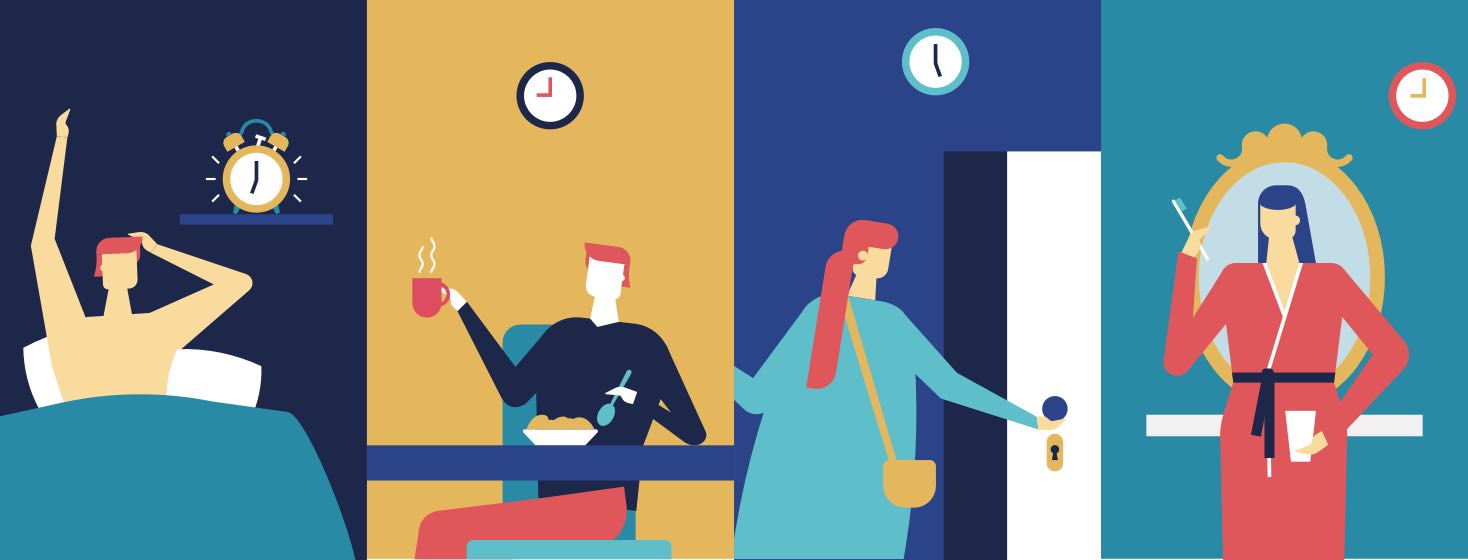The Impact of Circadian Rhythm on IBS
Do you notice flare-ups in your IBS symptoms when you go on vacation or stray from your usual routine? If so, you’re not alone, and there’s actually a biological reason it could be happening. There is a link between our gastrointestinal tract and our routine, and that link is impacted in part by our circadian rhythm- something you’ve likely heard of when people talk about sleep. Our circadian rhythm can be thought of as our biological clock, and research has found there may be circadian rhythm genes present within the cells of our digestive tract.1 With this in mind, there are certain strategies that can help to recalibrate your internal clock and avoid those IBS flare-ups, even when you stray from your everyday routine. Let’s dive into what the science says and learn about ways to keep those IBS symptoms at bay.
Behind the science
Scientists believe there may be a link between IBS symptoms and disruption of the circadian rhythm cycles located within the intestines.2 Studies have found that poor sleep quality, changes in routine, inconsistent food consumption, and health conditions related to inflammation may be linked to an increased risk of IBS symptoms. 2,3
Whether you work night shifts, are heading off on a family vacation, or constantly have unexpected changes to your normal routine, here are some ways to recalibrate your circadian rhythm to help manage those IBS symptoms.
Prioritize sleep
Make it your goal to get enough sleep, to get good quality sleep, and to maintain a regular sleep schedule. Choose one or two of these ideas to get started:
- Aim for an average of 8 hours of sleep. The average adult needs between 7 to 9 hours of sleep each night.4
- Establish a bedtime routine. Try to go to sleep and wake up at around the same time each day.5
- Aim to get in at least thirty minutes of aerobic exercise most days. Physical activity is linked to improved sleep quality.6
- Don’t let your screens steal your sleep! Your circadian rhythm gets thrown off when you are exposed to blue light at night.7
- Make sure to get in some sunshine during the day so that the natural light can keep your internal clock on track!5
- Keep your sleep environment cool. The ideal room temperature for sleeping is between 68 to 72F.4
- Keep your sleeping space dark and quiet. Do you have loud noises or bright lights outside your window? Consider earplugs, a dark sleep mask, a white noise app, or blackout curtains.
- Avoid consumption of caffeine in the last 4-6 hours prior to bedtime.4 Decaffeinated tea is a great afternoon drink to sip on instead!
Maintain regular mealtimes and follow an overall healthy eating pattern
Eating meals at erratic and unpredictable times can contribute to worsening of IBS symptoms. Instead, focus on following a healthy eating pattern and eating three balanced meals with snacks as needed throughout the day. Keep these meal-time tips and facts in mind:8
- Refrain from skipping meals and late night eating
- Focus on portion control - large meals may exacerbate symptoms
- Sit down for meals, eat slowly, and chew your food well
Consider incorporating probiotics for optimal gut health
The composition of gut bacteria in those with IBS may differ when compared to gut bacteria in the general population, and these differences may play a role in contributing to IBS.8 Furthermore, recent research has found that gut bacteria also follows circadian cycles, further alluding to the role of circadian rhythms on digestion.9
Probiotic supplementation may improve IBS symptoms by modifying gut microbial make-up. Scientists are still figuring out exactly which strains and doses of probiotics are most effective. If you decide to take probiotics, make sure to try only one supplement at a time, and consider working with a registered dietitian for more guidance on safe brands and if they’re truly indicated. Keep in mind that it may take up to four weeks before you notice an improvement in symptoms.8
Practice reframing your thoughts with Cognitive Behavioral Therapy Techniques
Cognitive behavioral therapy, or CBT, is centered on changing thinking patterns in order to change negative thoughts or actions.10 Studies have found that CBT can be an effective and reliable way to manage IBS. CBT therapy for IBS varies based on the individual, but may involve cognitive restructuring, relaxation techniques and problem-solving strategies, among other techniques. By focusing on modifying cognitive pathways and stress reduction, many patients are able to experience relief in their IBS symptoms.11 For an in-depth and personalized introduction to CBT, consider meeting with a CBT therapist.
Next time your routine is thrown off, and your IBS symptoms show up, fear no more. Follow the tips above to help your circadian rhythm stay on point and your IBS symptoms in check- choose one of these areas to focus on first, and set achievable goals to help manage your IBS!

Join the conversation